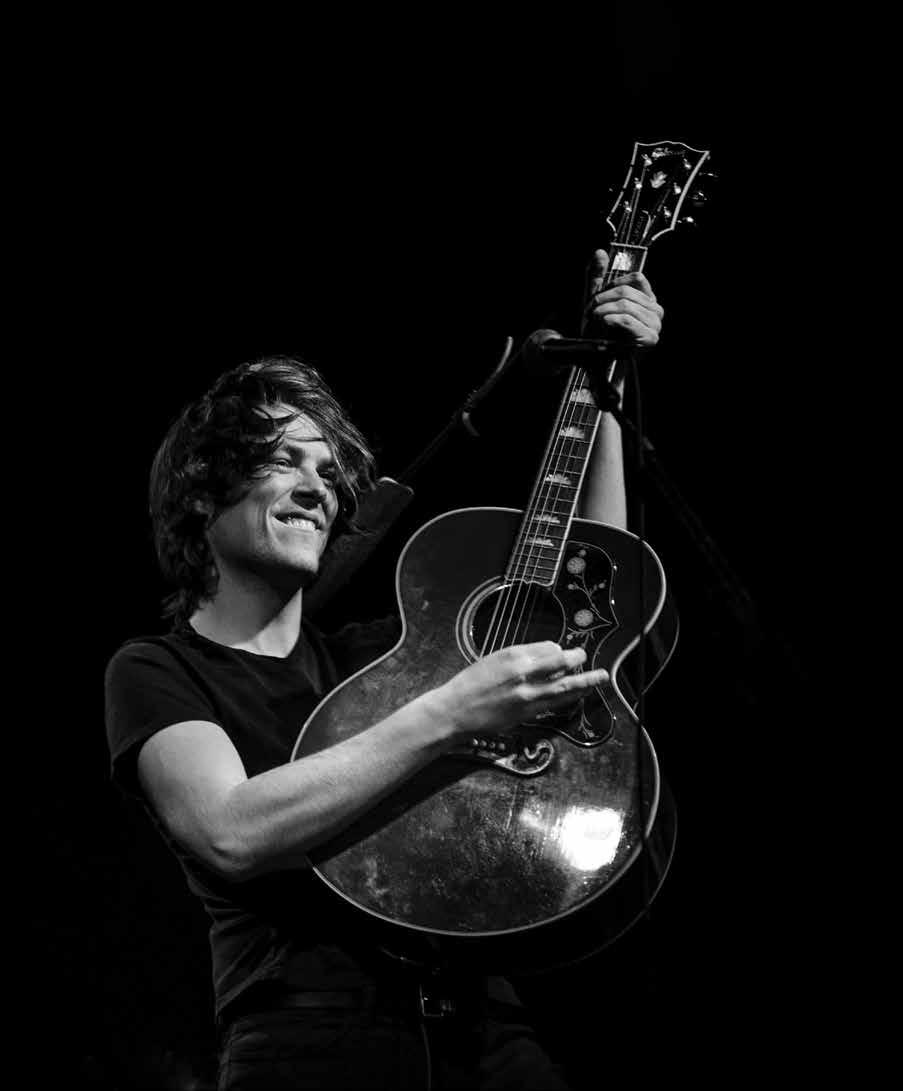
6 minute read
Trapper Schoepp Seeks Renewal on His New Album, ‘May Day
Trapper Schoepp
SEEKS RENEWAL ON HIS NEW ALBUM, ‘MAY DAY’
Advertisement
BY JOSHUA M. MILLER

Partway through the music video for Trapper Schoepp’s “River Called Disaster,” the Milwaukee songwriter passionately plunks away on a rustic, wooden piano entrenched in the middle of a river. Suddenly, the piano is set ablaze, a striking contrast of fire and water. Schoepp, however, continues playing his heart out. For the video shoot, the singer used a Baldwin spinet piano he had bought on Craigslist. He says it was “ceremonial and therapeutic” to set the piano ablaze.
That searing image is a metaphor for not only the song, but the past year in general. It refers to the destructive desires that people can get swept into, something that’s more visible lately with the pandemic. The song appears on Schoepp’s new album May Day, which is out Friday, May 21.
That lyrical message is indicative of the album’s themes— ghosts and rebirth, springtime and renewal, calm and the raging storm. He was intrigued by these different contrasts and juxtapositions and felt it was the right time to release an album. “I think there was a sense of urgency,” says Schoepp of creating the album. “After all we've been through and after this winter, we found a lot of solace making an album that would come out in the spring.”



Photo by Mark Costanzo.
May Day refers to the ancient holiday that marks the arrival of spring, putting new seeds in the earth to grow, as well as the international workers’ rights day. To that point, the album’s cover is a doctored photo of women dancing around the maypole by the Washington Monument. The image is even more fitting for him after “the disaster of a presidency that we all went through” and the lack of social interactions the past year.

“We wanted the album to represent a bit of the light at the end of the tunnel,” he says. “I think right now, people want to see people. So, we thought putting people together on the album cover was symbolic.”

SAFETY PROTOCOLS
Schoepp and his bandmates recorded the album last year at Wire & Vice in Wauwatosa with the help of Ian Olvera. Sessions revolved around following COVID-19 safety protocols set by the Recording Academy. Only a certain amount of people could be in the studio at once, and everyone needed to be masked unless they were singing in an isolation booth. They also ate outside and got regular tests. “It was important to keep everyone safe and give everyone some peace of mind,” he says.
The sessions also happened to occur during the citywide protests for racial equality. “It was surreal and scary for the people taking it to the streets to stand up against police brutality, and definitely wild to walk outside, between vocal takes in my surgical mask, and see the National Guard rolling by with a fleet of Humvees,” says Schoepp. “That was something that I don't think I’ll ever forget. Chilling would be the right word for it.”
Like other local musicians, the past year has been a challenging one for Schoepp. All his shows, including a lengthy European tour were canceled. He made the most of his time to keep up the “muscle memory” by performing livestream concerts for “socially conscious organizations” such as Milwaukee Guitars for Vets and The Rape, Abuse and Incest National Network. He also performed private Zoom concerts for fans around the world. “They kind of start off a little bit awkward,” he says. “And then everyone gets a drink in them or two, and stories start opening up, and we begin kind of sharing the energy that way.”
Schoepp also used the time to write new songs (he has another album of material ready) and learn how to play piano on his Yamaha upright. “River Called Disaster” was the first song that he’s written on piano. “The pandemic allowed me the time to home in on my piano skills a little bit. I'm not a piano player, I will admit that, but I got to play [it] on this album,” he says. “The pandemic gave a lot of time for me to recalibrate after all of the touring on the last album.”

TIME TO REFLECT
He used his time to reflect on the past few years. For example, “Astor Hotel” refers to the time he stayed at Hotel Astor in 2019—around the time of his previous release, Primetime Illusion—and went on the Ghost Tour of Milwaukee. He says the hotel is beautiful and has “the air of a haunting Stephen King novel.” After hearing the tour guide’s story of a 1935 fire at the hotel, which took the lives of a nurse and her deaf patient “who didn't wake to the nurse pounding at the door,” he decided to turn it into his own song.
“I took some creative liberties, and I re-imagined their story,” Schoepp says. “[It] starts a little bit slow, and timid, and quiet, and then sort of bursts into flames with that guitar solo and experimental part.”
Other songs have a more radio-centric inspiration. After hearing a report on NPR about people reaching out to their ex-lovers, he wrote “Solo Quarantine.” “It’s about a late-night call between a guy who is rather desperate and an old flame of his. He's the classic guy who's talking too much,” says Schoepp. “It’s sort of tragic and humorous at the same time.”
“I Am a Rider,” meanwhile, was inspired by hearing the phrase “aviate, navigate, communicate” on the radio. It refers to how a pilot learns to fly, and he saw parallels in daily life, especially touring life. He’s inspired by the current “age of anxiety” and reflected lyrically on “all the time I've spent on the road for the last record.”
While more livestream concerts are likely, he’s eager to play some in-person shows. That could include drive-in and socially distanced concerts. “One thing that you really miss during these Zoom concerts is that kind of magic and that exchange of energy that you get from seeing people or hearing people, feeling the wind blow by at Summerfest or whatever,” he says. “You miss all the kind of atmospheric elements.”
While not usually one to look back, Schoepp’s proud of the catalog he’s compiled the past decade since the release of Run, Engine, Run.
“Some of it would be hard to script,” Schoepp says. “It’s a lot of twists and turns, ups and downs, highs and lows. There’s a magic that songs offer. That feeling when you write another song, it's sort of a strange magic. So, I think that's what keeps me going.” He hopes his latest “offers a bit of an escape for people.”

Joshua Miller is a music writer and frequent contributor to the Shepherd Express.










